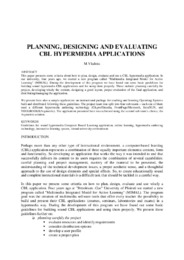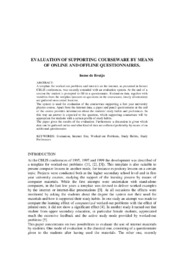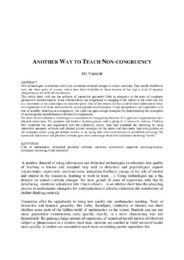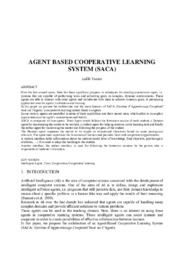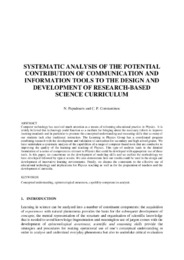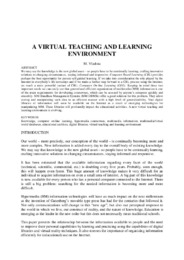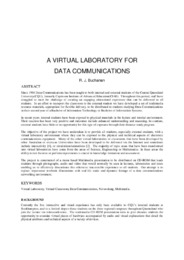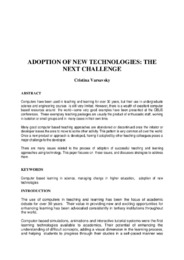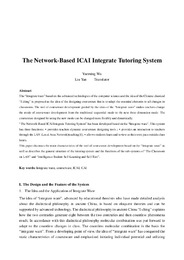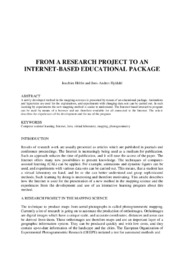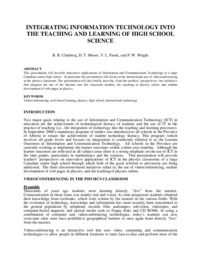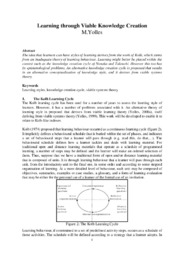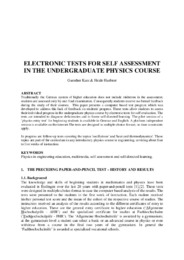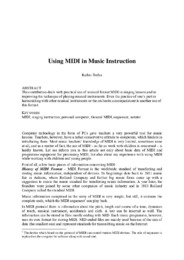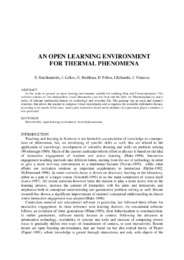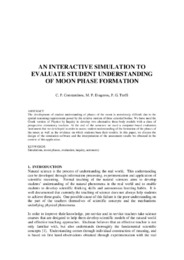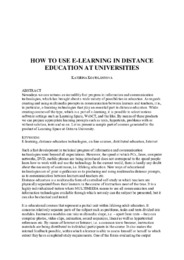Browsing Computer Based Learning in Science (CBLIS) by Issue Date
Now showing items 1-20 of 337
-
Planning, designing and evaluating CBL hypermedia applications
(Pedagogical Faculty of University of Ostrava, 2001)This paper presents some criteria about how to plan, design, evaluate and use a CBL hypermedia application. In our university, four years ago, we started a new program called "Multimedia Integrated Model for Active Learning" ... -
Evaluation of supporting courseware by means of online and offline questionnaires
(Pedagogical Faculty of University of Ostrava, 2001)A template for worked out problems and tutorials on the internet, as presented in former CBLIS conferences, was recently extended with an evaluation system. At the end of a session the student is prompted to fill in a ... -
Another way to teach non-congruency
(Pedagogical Faculty of University of Ostrava, 2001)New technologies in education allow and sometimes demand changes in school curricula. They enable children to look into those parts of science, which have been forbidden to them because of too high a level of required imagination ... -
Agent based cooperative learning System (saca)
(Pedagogical Faculty of University of Ostrava, 2001)Over the last several years, there has been significant progress in techniques for creating autonomous agent, i.e. systems that are capable of performing tasks and achieving goals in complex, dynamic environments. These agents ... -
Systematic analysis of the potential contribution of communication and information tools to the design and development of research-based science curriculum
(Pedagogical Faculty of University of Ostrava, 2001)Computer technology has received much attention as a means of reforming educational practice in Physics. It is widely believed that technology could function as a medium for bringing about the necessary reform to ... -
A virtual teaching and learning Environment
(Pedagogical Faculty of University of Ostrava, 2001)We may say the knowledge is the new global asset – so people have to be continually learning, crafting innovative solutions to changing circumstances, staying informed and responsive. Computer Based Learning (CBL) ... -
A virtual laboratory for data communications
(Pedagogical Faculty of University of Ostrava, 2001)University(CQU), formerly Capricorn Institute of Advanced Education(CIAE). Throughout this period, staff have struggled to meet the challenge of creating an engaging educational experience that can be delivered to all students. ... -
Adoption of new technologies: the next challenge
(Pedagogical Faculty of University of Ostrava, 2001)Computers have been used in teaching and learning for over 30 years, but their use in undergraduate science and engineering courses is still very limited. However, there is a wealth of excellent computer based resources ... -
The network-based ICAI integrate tutoring system
(Pedagogical Faculty of University of Ostrava, 2001)The “Integrate ware” based on the advanced technologies of the computer science and the idea of the Chinese classical “I ching” is proposed as the idea of the designing courseware that is to adapt the essential elements ... -
From a research project to an internet-based educational package
(Pedagogical Faculty of University of Ostrava, 2001)A newly developed method in the mapping sciences is presented by means of an educational package. Animations and hypertexts are used for the explanations, and experiments with changing data sets can be carried out. In ... -
Computer support of innovation´s Creativity
(Pedagogical Faculty of University of Ostrava, 2001)Using of algorithmic methods of the intensification of constructive process logically results in an idea for the creation of computer programs capable of raising efficiency of invention and design activity. In a basis of ... -
New interactive decision games implemented in dega environment
(Pedagogical Faculty of University of Ostrava, 2001)Interactive decision games are specifically designed to simulate options and issues of the uncertainty and complexity involved in decision making. Games are used in a PBL (problem based learning) situations, where students ... -
Integrating information technology into the teaching and learning of high school science
(Pedagogical Faculty of University of Ostrava, 2001)This presentation will describe innovative applications of Information and Communication Technology in a large Canadian senior high school. In particular the presentation will focus on the instructional use of videoconferencing in ... -
Learning through viable knowledge creation
(Pedagogical Faculty of University of Ostrava, 2001)The idea that learners can have styles of learning derives from the work of Kolb, which stems from an inadequate theory of learning behaviour. Learning might better be placed within the context such as the knowledge creation ... -
Designing applets that foster constructivist teaching and learning
(Pedagogical Faculty of University of Ostrava, 2001)The Modular Approach to Physics (MAP) project makes extensive use of “educational objects” which include Flash animations, Java Applets and Java Applications. A paramount concern in the design of these objects has been to ... -
Electronic tests for self assessment in the undergraduate physics course
(Pedagogical Faculty of University of Ostrava, 2001)Traditionally the German system of higher education does not include midterms in the assessment; students are assessed only by one final examination. Consequently students receive no formal feedback during the study of ... -
Using midi in music instruction
(Pedagogical Faculty of University of Ostrava, 2001)The contribution deals with practical use of musical format MIDI in singing lessons and in improving the technique of playing musical instruments. Even the practice of one s part in harmonizing with other musical instruments ... -
An open learning environment for thermal phenomena
(Pedagogical Faculty of University of Ostrava, 2001)In this work we present an open learning environment, suitable for teaching Heat and Thermodynamics. The software consists of two independent visual laboratories (one for Heat and the other for Thermodynamics) and a series ... -
An interactive simulation to evaluate student understanding of moon phase formation
(Pedagogical Faculty of University of Ostrava, 2001)The development of student understanding of phases of the moon is notoriously difficult due to the spatial reasoning requirements posed by the relative motion of three celestial bodies. We have used the Greek version of ... -
How to use e-learning in distance education at Universities
(Pedagogical Faculty of University of Ostrava, 2001)Nowadays we can witness an incredibly fast progress in information and communication technologies, which has brought about a wide variety of possibilities in education. As regards creating and using multimedia prompts in ...
